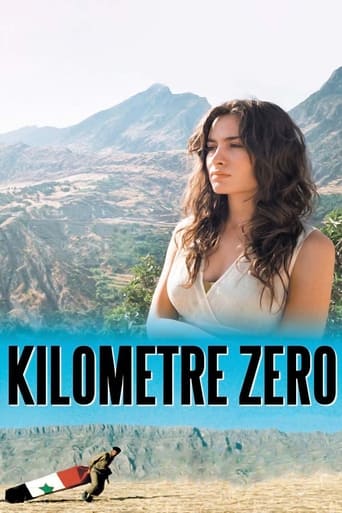osmangokturk
As stated in french ' notre passé est triste, notre present est tragique, mais heureusement on n'a pas d'avenir" (our history is sad, our present is tragic, fortunately we dont have any future). This movie is a bit about the history of the Kurds in Iraq. Besides the obvious anti war tone of the movie, I gues this movie tries to highlights some facts about the Kurdish history. A Kurdish movie made in 2005 with the artists from Kurds from Iraq and Turkey.in addition ot the anti-war tone of the movie, I can underline some messages: -The the despair of the Olds who put the Kurdish generations in the illiterate and oblivion.
-The very frequent and well known fact that since a Kurd run a way from his own militia would be forced to serve in the bang of disgusting torturer and his life would be a mess.
-A kurd will usually be despised and deceived by the others.
-A kurd will not be both pious and racist towards other languages ( The Kurd will feel anger and despair watching the Kurdish soils around him, while the arabian racist driver praying).
-Western had forgotten the Kurds but nevertheless it is only them where Kurds today could find the refuge. is the declared liberty at the end of the movie real? We have to wait the future to tell us.
Ersbel Oraph
This movie is the wet dream of any ex soviet film maker, director, producer, script writer, whatever. And not just ex soviet, any Eastern European too. The irony, the depressive scenes, the ugly irony, the pointless violence, simply all of it would feature proudly in any of the tens (or hundreds?) of crap features about how the stalinists came and pushed that particular proud savage territory from organic apple makers to polluted bankrupt industry nobody seems to need.Sadly this is not enough. The trailers that came as a bonus with the DVD are far better than the whole film. There is a simplicity and an irony that simply can't be found in the whole hour and a half. The camera is nice. The idea is even better. And everything seems to stop there. The feature is too long for the story. And it has timing problems -- for example a man who died after the main characters leave the front is mysteriously already waiting somewhere near the end.Contact me with Questions, Comments or Suggestions ryitfork @ bitmail.ch
Claudio Carvalho
In the late 80's, in the small village of Amedi, the Kurd electrician Ako (Nazmî Kirik) is forced to leave his family and join the Iraqi army to fight in Basra against Iran. When he is assigned to escort the coffin of a deceased soldier to his family, the crosses the country with an Arab driver and plots a scheme to desert the army and bring his wife and son to Paris."Kilomètre Zero" is a film of the Kurdish director Hiner Saleem with a black humorous propaganda against Saddam Hussein's regime but unfortunately with bad taste. I did not see the point of the cow defecating in front of the camera, or the offense against the flag of Iraq since Ako's attitude is neither dramatic nor funny and the flags of all countries should be respected. My vote is four.Title (Brazil): "Quilômetro Zero" ("Zero Kilometer")
fnorful
Set in 1988, the young man Ako is conscripted to fight (along with his fellow Kurds) for the armed forces of Iraq in their conflict with Iran. The draft process is fraught with ethnic hatred and the newly-inducted soldiers conduct the fight only with an eye to helping themselves to find a way home, even if it means a self-inflicted gunshot wound.Ako gets a chance to return home as part of a funereal honor guard, traveling with an Arab driver in a truck carrying a flag-draped coffin. As the body rots in the hot mid-Eastern sun the Arab and the Kurd unsuccessfully suppress their animosity towards each other. The hatred which continues to this day (although it is both Shiite and Sunni Arabs who hate each other as well as hating the Kurds) lends but a small sense of the tragedy that is inevitable in ethnic conflicts. A tragedy seemingly mocked throughout the film by a statue of Saddam Hussein sitting on the back of a flatbed truck, running about the countryside in constant salute, mutely exhorting Iraqis to the greater glory of the state.Ako does get home, and his family's story is somewhat resolved at the end as we fade to April 9, 2003 in Paris. On this day we see Ako and his wife together in Paris, jubilant at the news of the US taking of Baghdad. At this point the current-in-time viewer realizes how this movie lives up to its name: given the state of Iraq in early 2006 three years after the US invasion, we know that is where Iraq today is at Kilometer Zero.

